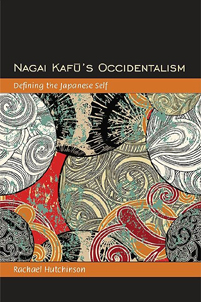Nagai Kafū’s Occidentalism: Defining the Japanese Self (author) SUNY Press 2011

Nagai Kafū’s Occidentalism: Defining the Japanese Self (author) SUNY Press 2011
Describes how writer Nagai Kafū (1879–1959) used his experience of the West to reconcile modernization and Japanese identity.
Nagai Kafū (1879–1959) spent more time abroad than any other writer of his generation, firing the Japanese imagination with his visions of America and France. Applying the theoretical framework of Occidentalism to Japanese literature, Rachael Hutchinson explores Kafū’s construction of the Western Other, an integral part of his critique of Meiji civilization. Through contrast with the Western Other, Kafū was able to solve the dilemma that so plagued Japanese intellectuals—how to modernize and yet retain an authentic Japanese identity in the modern world. Kafū’s flexible positioning of imagined spaces like the “West” and the “Orient” ultimately led him to a definition of the Japanese Self. Hutchinson analyzes the wide range of Kafū’s work, particularly those novels and stories reflecting Kafū’s time in the West and the return to Japan, most unknown to Western readers and a number unavailable in English, along with his better-known depictions of Edo’s demimonde. Kafū’s place in Japan’s intellectual history and his influence on other writers are also discussed.
“Hutchinson’s powerful contribution will take its place among the most important books published on Kafū. It stands apart because she expands on important issues in his writing, including Orientalism/Occidentalism, identity, and social critique.” — Douglas N. Slaymaker, author of The Body in Postwar Japanese Fiction.
